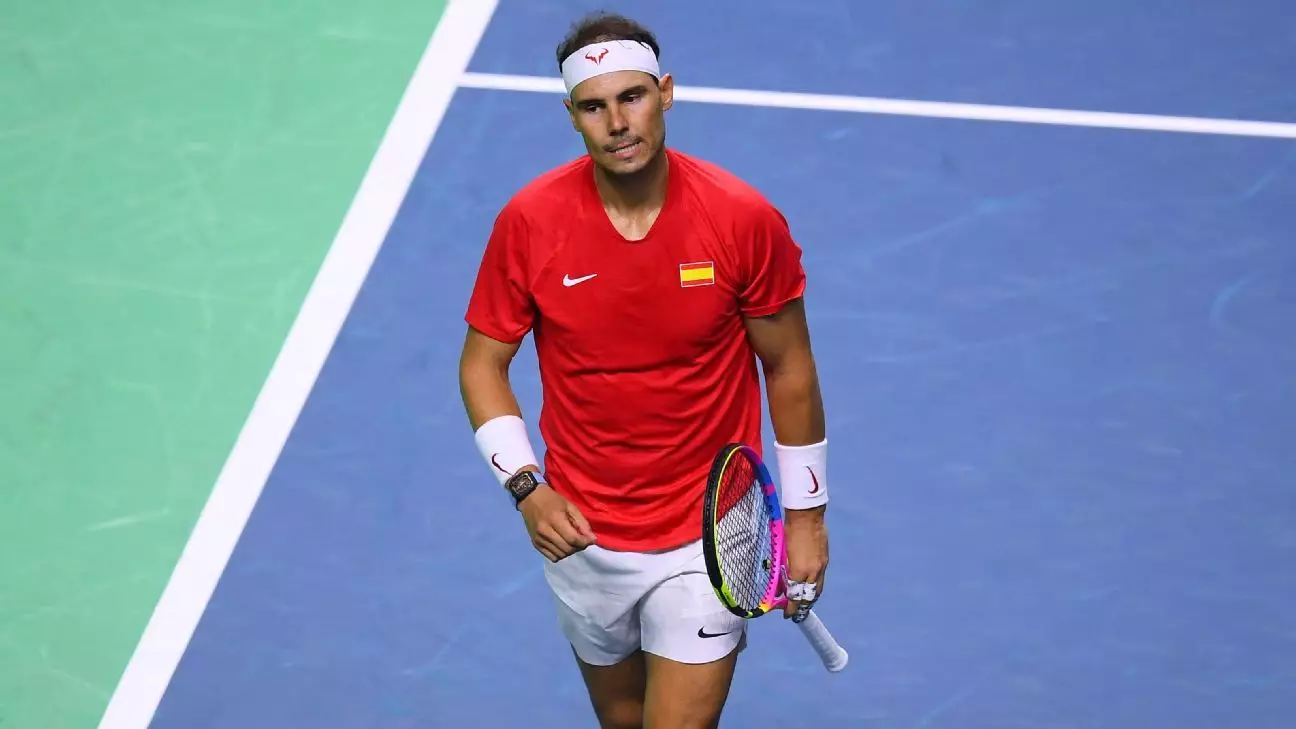Rafael Nadal’s recent performance in the Davis Cup quarterfinals against Botic Van De Zandschulp has marked a poignant moment in the tennis legend’s illustrious career. Falling short with a score of 6-4, 6-4, Nadal expressed his deep misgivings about his ability to contribute to the Spanish team as they aim for victory in what could be his final tournament. As he nears retirement, his reflections reveal more than just disappointment in his performance; they encapsulate a veteran athlete’s struggle with legacy, responsibility, and the weight of expectations.
Nadal’s candid self-assessment speaks volumes about the humility that has characterized his career. Rather than clinging to his past glories, he expressed uncertainty about deserving a place in the lineup over another seasoned player, Roberto Bautista Agut. “I wouldn’t pick myself,” he stated bluntly, acknowledging that his current form may not have warranted selection. This statement reflects not only his awareness of the competitive landscape but also his respect for the team dynamics and the role of the captain, David Ferrer, in making those crucial decisions.
During the match, Nadal acknowledged the emotional complexity surrounding his participation, evident from his somber tone and reflective words. Facing what could be his last singles match, he conveyed a mix of nostalgia and regret, feelings that many athletes experience as they contemplate retirement. The notion that he might have played his final Davis Cup match added a layer of urgency to his performance, fueling the palpable nerves he described.
In emphasizing these emotions, Nadal opened a window into the psyche of a champion who has been at the pinnacle of the sport for nearly two decades. Athletes often speak of the significance of their final appearances, but few approach it with such raw honesty. This moment was more than just another match; it represented not just the end of a competitive chapter but of a unique career that has inspired millions. His acknowledgment of mixed feelings highlights how challenging it can be to transition from a competitive role to a different phase of life.
Despite his own struggles, Nadal showed unwavering support for his teammates, particularly highlighting the potential for fellow player Carlos Alcaraz to step up in future matches. This sense of camaraderie emphasizes the essence of team sports—where individual struggles become part of a collective endeavor. Nadal’s commitment to helping the team, even if it means sacrificing personal aspirations, is a testament to his character and the values that have defined his lengthy career.
He articulated a yearning to contribute wherever needed, stating, “I tried to enjoy and play with the right energy.” This is a significant component of his legacy. It is not merely about winning titles but about fostering a spirit of unity and resilience among teammates, qualities that have been essential to Spain’s success in international tennis. Nadal’s focus on teamwork reinforces the idea that while individual accolades are vital, the shared experience and support of colleagues can elevate performance and morale.
Looking forward, Nadal’s hope for Spain to advance in the tournament indicates his unwavering competitive spirit. He voiced a desire to return to the court, demonstrating that even in moments of doubt, the drive to strive for greatness remains paramount. Such determination encapsulates why fans have admired him throughout his career.
Nadal’s situation draws attention to the inevitable transition many athletes face in bidding farewell to their professional lives while also exiting on a note of potential. Whether or not he returns to play in the Davis Cup, the essence of his journey resonates deeply: greatness often lies not only in victories but in the relentless pursuit of excellence and the humility to recognize one’s limitations. Whether this chapter concludes with triumph or tribulation, Rafael Nadal’s story will undoubtedly leave an indelible mark on the sport of tennis, setting a standard for future generations curious about both greatness and character.

